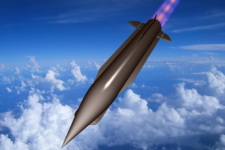
Jake Sullivan, US National Security Advisor, during a joint press conference with Andrii Yermak, Head of the Office of the President of Ukraine, on March 20, 2024 in Kyiv, Ukraine. (Viktor Kovalchuk/Global Images Ukraine via Getty Images)
WASHINGTON — Even as the White House has pushed billions of dollars towards Ukraine and Israel, the American defense industry has been wary of standing up production capacity over fears that it will invest and then suddenly see government demand drop quickly.
But that fear is unfounded, according to National Security Advisor Jake Sullivan, who also said that there is no planning underway for another supplemental request to come this year following this week’s passage of $95 billion in aid for Ukraine, Israel and the Pacific.
Speaking to a small group of reporters at the White House, Sullivan expressed confidence that even if peace broke out tomorrow, Western nations have built themselves such a deep hole in terms of stockpiles that production will stay strong in coming years.
“Look, there is such a gap between where the collective West is and where it needs to be in terms of munition stockpiles, that this is not going to be a problem for a long time. There is a need for replenishment on all of these systems that extends out years,” Sullivan said. “If anything, I believe that our defense industry is still underestimating, rather than overestimating” global demand for weapons production in the coming years.
“Patriot missile batteries are a great example. There are going to be orders piling up for Patriot missile batteries out the door, regardless of what happens” in the coming year in Ukraine.
He may have a point. Since the start of the Ukraine conflict, the NATO nations have flowed millions of shells, bullets and missiles to Kyiv’s aid, in some cases emptying stockpiles of weapons in order to prioritize Ukraine’s defense. As a result, those nations are now looking not just to get back to where they were on Feb. 21, 2022, but increase their stockpiles in order to avoid going so low again.
More broadly, Sullivan said the increased production from the defense industrial base was a “net good” for American security.
“The arrows are all pointing in the direction of the collective West ramping up its defense industrial base in a way that has been long overdue. That will help Ukraine, but that also help us,” he said.
Byron Callan, an analyst with Capital Alpha Partners, called Sullivan’s comment’s “really interesting” for industry, although he noted that what is in demand will likely change.
“Do we need as much 155 production in 2026 or 2028? No, probably not. But we’ll need counter-UAS, more air defense, ballistic missile defense, deep precision strike — I think that’s a given,” Callan added, agreeing with Sullivan that Patriot will likely be in demand long-term given the trend towards missile development worldwide.
Still, Callan noted that there wasn’t a lot of celebration on the quarterly earnings calls this week, despite the passage of the supplemental funding bill. He chalked that up to “uncertainty” among industry about the way the bill, which doesn’t follow the kind of justification budget documentation that usually comes out of the Pentagon, was structured, as well as a sense that Sullivan may be wrong and that demand signal could change.
Another Supplemental?
Getting the $95 billion supplemental package passed this week was the work of months and months of careful political wrangling from the Biden administration and its allies in Congress. At many points it appeared unlikely to happen, and dragged on long enough that Ukraine began having to ration ammo in the field — something Sullivan on Wednesday directly said led to Ukrainian territorial losses.
So, is there another supplemental in the works? “There are no plans” for one right now, Sullivan said.
“I think it’s premature on the back of a hard fought effort to get this bill passed for me to begin speculating about or projecting out to make an extra request,” he said. “I’ll just say for us: This one will sustain us, we will focus on executing and delivering effectively and then we’ll deal with the future as it comes.”
The Biden administration has assessed that the $61 billion earmarked for Ukraine will cover Kyiv’s needs through at least the end of the year and potentially into 2025, although how far into the new year was unclear.
“What is that based on? If you look at the amount of [Presidential Drawdown Authority] and look at the amount of [Ukraine Security Assistance Initiative] and you look at the number of months left in this year, and you look at our run rate — even as we were doing things like preparing for the counter offensive, we have the magnitude of dollars to be able to meet what we think any kind of reasonable contingency,” Sullivan said when asked about that assessment.
“Now, you’re absolutely right, that something totally nonlinear could happen. And obviously the reason you have supplemental funding bills is for that purpose,” he continued. “But I do not expect it in any way, we’re not anticipating that, we are not currently planning for that because what we have planned for is for this to sustain us, at least through the end of this year and then into next year. And how long that goes, we’ll have to adjust over time.”
TAI exec claims 20 Turkish KAAN fighters to be delivered in 2028
Temel Kotil, TAI’s general manager, claimed that the domestically-produced Turkish jet will outperform the F-35 Joint Strike Fighter.


























